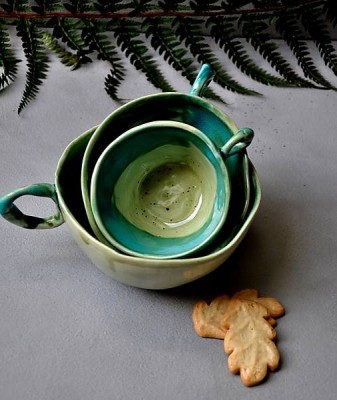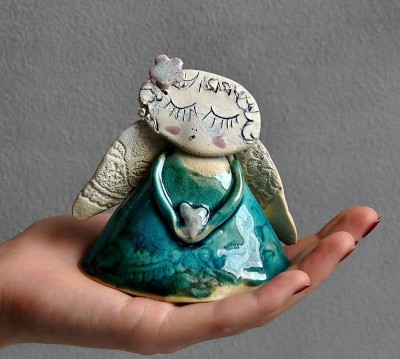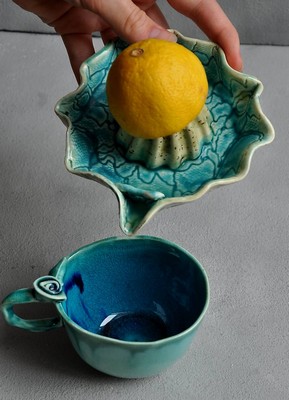The story of one of the first EoC companies in Slovakia, In Vivo: from the beginnings in street markets to a beautiful shop and 20 employees, until the closure due to the Covid pandemic. Today: courage to reinvent and start again.
collected by Miriam Elizabeth Fogarty
They can last forever, or they can break in an instant. In In Vivo' s artefacts represent the strength and fragility of the company that produces them.
This story has its roots in 1993, when Slovakia was emerging as a republic and, simultaneously, many new economic realities started appearing, in a context where becoming an entrepreneur meant being a pioneer and facing a rather significant bureaucratic jungle. This was not an obvious choice for Gabriela Kosečková, a recent graduate then, spending some time in Italy, where she came into contact with the idea of the economy of communion, a concept that overwhelmed her: she discovered a way that allowed her to create things, to earn money and do good at the same time. Her creativity was set in motion and with this new project in her pocket, she returned to Bratislava, where she confided her idea to her sister Lucia, then a graduate student, who was just as impressed as she was. So they acquired a VAT number and Gabi started to create clay products in their small flat. Their warehouse was a suitcase, and with it they went to the streets and squares to sell their products. The idea of a real shop was not even on the horizon for them at the time.
rather significant bureaucratic jungle. This was not an obvious choice for Gabriela Kosečková, a recent graduate then, spending some time in Italy, where she came into contact with the idea of the economy of communion, a concept that overwhelmed her: she discovered a way that allowed her to create things, to earn money and do good at the same time. Her creativity was set in motion and with this new project in her pocket, she returned to Bratislava, where she confided her idea to her sister Lucia, then a graduate student, who was just as impressed as she was. So they acquired a VAT number and Gabi started to create clay products in their small flat. Their warehouse was a suitcase, and with it they went to the streets and squares to sell their products. The idea of a real shop was not even on the horizon for them at the time.
Not only entrepreneurship was a novelty, but also the items they offered were of a completely new, one might say unknown, kind. People were only familiar with traditional ceramics, which were usually displayed in the cabinets inside the house and never even touched. Gabi and Lucia, however, proposed a new design and the  prospect of everyday use of their products. A great challenge that could have collided with a market not ready to welcome them, but their creations were absolutely successful and the suitcase went home empty every time. Their work pace became more and more frenetic, the sisters took turns selling and producing, the available space became tight and new needs emerged. So in 1997 they opened the shop. Production and selling now took place in the same shop, until it had to be enlarged and production moved to the charming atelier where it is still located today. In the meantime, the name In Vivo was chosen, meaning 'from life for life'.
prospect of everyday use of their products. A great challenge that could have collided with a market not ready to welcome them, but their creations were absolutely successful and the suitcase went home empty every time. Their work pace became more and more frenetic, the sisters took turns selling and producing, the available space became tight and new needs emerged. So in 1997 they opened the shop. Production and selling now took place in the same shop, until it had to be enlarged and production moved to the charming atelier where it is still located today. In the meantime, the name In Vivo was chosen, meaning 'from life for life'.
Even though the competition was also beginning to make its way through, the quality of In Vivo's products, their originality and inspiration continued to keep  he company strong, employing 20 people. Until the pandemic broke out.
he company strong, employing 20 people. Until the pandemic broke out.
Shutters down, empty streets, rent to pay, salaries to pay.
Lucia and Gabi had to face some difficult decisions, which they did in the spirit of the economy of communion: for them it was not a question of “making a list of people and eliminating as many as possible”, but “looking at each employee as a person, in his or her own life situation, and how to keep them as long as possible under these conditions.” In the beginning it was not clear how the situation would evolve, but when it proved not to be a passing thing, lay-offs had to be done reluctantly, without any false promises. The biggest and most painful step came in August: closing the shop.
Then a sign of hope in this darkness came from the network of EoC companies. A group of Polish entrepreneurs, wanting to support a company affected by the pandemic crisis, chose In Vivo. In addition to their gratitude for this contribution, they were immediately encouraged to use this money responsibly to multiply the good they had received, giving work to those who had none.
The company's current focus is on diversifying its clientele, intensifying its relationships and network, strengthening its online sales and starting the restyling process that the company, which currently employs four people, has been putting off for a long time.
"The crisis," says Lucia, "has shown that even the impossible is possible. Everything is possible, you just have to want it.”
Photo credits: Martina Baumann and In Vivo archives.








